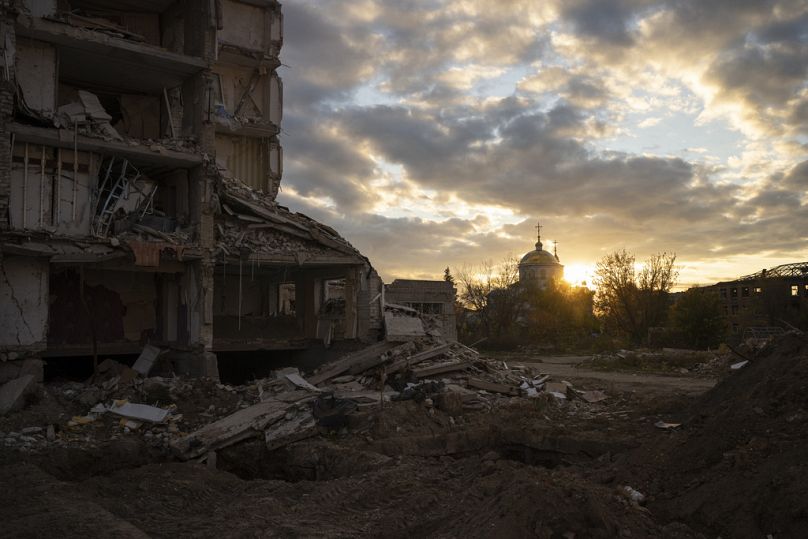The latest developments from the Ukraine war.
Zelenskyy rules out wartime elections
“Now is not the time for elections,” Ukraine's president Volodymyr Zelenskyy said on Monday, trying to put to rest a growing debate amid Russia's grinding invasion.
 ADVERTISEMENT
ADVERTISEMENT
 ADVERTISEMENT
ADVERTISEMENT
"Now is the time for defence, for battle, on which the fate of the state and people depends, and not for farce, which only Russia expects from Ukraine," Zelenskyy said in a speech. "I think this is not the time for elections.
“We must come together, not divide ourselves, not disperse ourselves in quarrels or other priorities,” he added.
On Friday, Ukrainian foreign minister Dmytro Kuleba said the Ukrainian president was "weighing the pros and cons" of holding elections.
If Russia had not invaded in February 2022, legislative elections would have taken place this October, and presidential elections in March 2024. The introduction of martial law has suspended these votes.
However, Kyiv now finds itself in a dilemma. Western allies, notably the US, are pressing Ukraine to hold elections, with some commentators arguing they could burnish Ukraine's democratic credentials in contrast with an increasingly authoritarian Russian state.
Yet, there are many obstacles. Nearly 20% of Ukraine is occupied by Russia, millions of Ukrainians have fled the country, soldiers on the frontline would struggle to vote, and any election would face critical security risks.
“We all understand that today, in times of war, when the challenges are numerous, it is absolutely irresponsible to introduce the subject of elections in society,” Zelenskyy insisted.
Wagner fighters training Chechen forces - Kadyrov
The notorious leader of the Chechen Republic Ramzan Kadyrov has said a "large group" of former Wagner mercenaries are training his AKHMAT special forces.
AKHMAT, widely considered Kadyrov's private army, would "be joined by fighters who have excellent combat experience and have proven themselves as brave and efficient warriors," claimed the Putin-backed warlord.
"I am confident that in the upcoming battles they will fully live up to their reputation."
Wagner mercenaries have played a key role in Russia's invasion of Ukraine, especially the months-long bloody battle for Bakhmut.
However, since the group's leader Yevgeny Prigozhin died in a plane crash after leading a brief mutiny against Moscow in June, the future of the mercenary group has been unclear.
Writing on Telegram, Kadyrov said that before his AKHMAT force carried out missions, they needed to "undergo coordination" to "significantly increase their effectiveness" on the frontline.
He said "tactical shooting courses, field medicine, training for snipers, machine gunners, sappers, and artillerymen" were part of an "extensive training programme".
Chechens are fighting on both sides in Ukraine. Those under Kadyrov have reportedly been used to discipline and reportedly even execute dissenting Russian soldiers, as well as intimidate civilians in Ukraine.
However, analyst Harold Chambers previously told Euronews they were "better at social media than fighting", questioning their real combat effectiveness beyond TikTok and Instagram footage.
NATO condemns Russian withdrawal from arms treaty
NATO member states on Tuesday condemned Russia's decision to formally withdraw from the landmark treaty limiting conventional military forces in Europe.
Russia first decided to suspend its participation in the 1992 treaty on conventional weapons in Europe in 2007, but Moscow only announced its formal withdrawal from the treaty this Monday.
Moscow's war against Ukraine has dealt a fatal blow to the multi-treaty arms control regime that has helped maintain the balance of power in Europe for decades.
The NATO allies announced in a communiqué that they "condemn Russia's decision to withdraw from the Treaty on Conventional Armed Forces in Europe (CFE), and its war of aggression against Ukraine, which is contrary to the objectives of the Treaty".
The membership also announced their intention to "suspend [Russia's] participation in the CFE Treaty for as long as necessary", the statement added.
For its part, the US said that it would be "unacceptable" for it and the NATO allies to remain committed to a treaty abandoned by Russia.
"The suspension of CFE obligations will strengthen the Alliance's defence and deterrence capability by removing restrictions that impact our plans, deployments and exercises", said US National Security Advisor Jake Sullivan.
The CFE treaty imposed for the first time legal and verifiable limits on the forces of the 30 countries that signed the agreement. It was seen as the cornerstone of the security arrangements agreed at the end of the Cold War.
According to NATO, it led to the destruction of some 100,000 items of military equipment, including tanks, artillery and attack helicopters.











